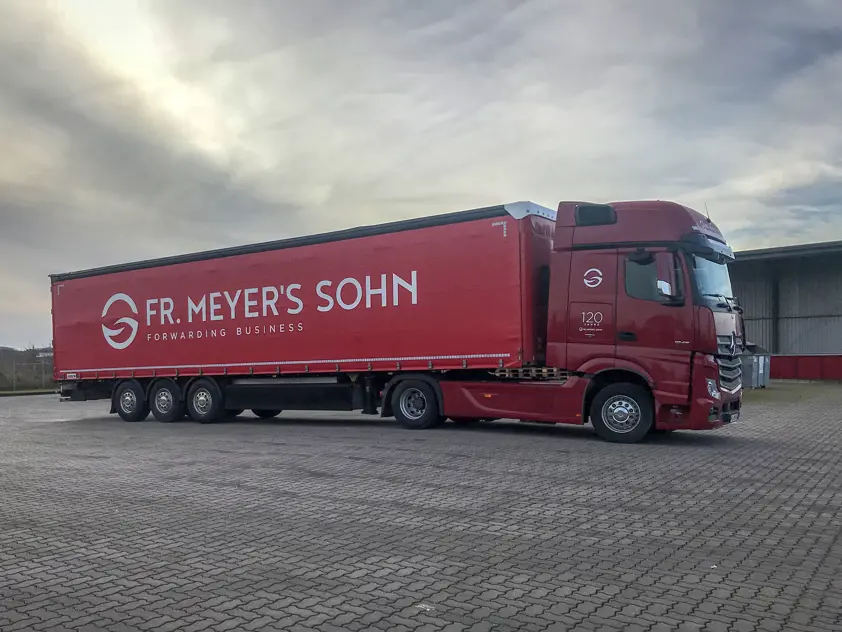FMS is one of Europe’s leading transport and logistics companies and the market leader in paper and forestry product logistics, with 15 million tonnes of transported forest products a year. While these may be challenging times for transport companies, Heiko Voigt, FMS’s CEO EMEA region and Hans Meulenberg, Senior Vice President, Strategic Account Management, say there is reason to be optimistic about the future.
“We believe technology holds the key to a lot of the capacity- and cost-related challenges that logistics companies such as ours are currently contending with,” says Meulenberg.
FMS transports pulp and paper overland using three different transport solutions: truck, rail and river barge, each of which is facing its own set of challenges.
Driver power
“In the European trucking market, the principal issue is the shortage of capacity caused by, among other things, a lack of qualified drivers,” explains Voigt, adding that trucks across the continent are standing still as a result. “Truck drivers know there is more demand than supply and they’re asking for more money.”
In combination with already-high fuel prices and the need to comply with ever-stricter legislation, increased pay demands are driving up the total cost of road transport.
The rail segment, meanwhile, is also suffering from its own lack of qualified drivers, as well as from disruptions to services caused by the growing frequency of heavy storms. Extreme weather is also a concern for river barge services, where dry summers have caused water levels on many European rivers to drop.
With so many obstacles blocking the road to establishing a stable logistics chain, how does FMS maintain a positive outlook for the future?
Focus on solutions
“We have to accept that these things are happening,” says Meulenberg, “Instead of trying to make them go away, we believe in finding solutions and, together with our customers, we’re looking for ways to minimise their impact.”
For example, one-way transport is one of the greatest causes of unnecessary waste and losses in the logistics chain.
“When a truck drives from, say, Germany to Spain fully loaded, and then drives back empty, it’s a huge waste of fuel, driver wages and emissions,” continues Voigt. “Using modern IT platforms, truckers can easily look online for available cargo for their return route to make optimal use of the truck and their time.”
A navigation system is another easy-to-use tool which can help truckers avoid traffic jams, thereby reducing the number of paid hours wasted on the road, as well as cutting emissions.
A number of more complex technologies look set to deliver huge efficiency gains to the supply chain in the longer term. Examples include blockchain, where the data from every step in the logistics chain is centrally stored and shared between all those involved, resulting in massive benefits in terms of transparency and productivity; driverless vehicles that will cut costs through increased fuel efficiency and by eliminating the need for a driver; and, last but not least, electrification, with the huge potential cost savings that electric and hybrid vehicles will deliver, once batteries become powerful enough to reduce dependence on diesel.
Bright future
Looking at the pulp market, prospects are looking up. Compared with just a few years ago, when the segment appeared doomed as paper consumption dwindled, growing global demand for both tissue and packaging spells a positive outlook for pulp. And although the shortage of transport capacity may present an obstacle at the present time and for the next couple of years, there is reason to believe the current situation will see significant changes in the mid-term future.
“A future defined by smart tech, driverless trucks, electric vehicles and increased connectivity will help us optimise the use of different modes of transport, reduce unnecessary waste, and secure a stable logistics chain for the future,” concludes Meulenberg.
Facts FMS
Founded in 1897, Fr. Meyer’s Sohn (FMS) is a global, family-owned freight forwarding and logistics company that specialises in the international transportation of bulk goods. The company is the market leader in paper and forestry product logistics and one of the 10 largest sea freight shipping companies in the world. It transports more than 850,000 TEU/year, with the forestry segment accounting for more than 70% of total volumes. (TEU = Twenty-Foot Equivalent Unit)
Text: Isabelle Kliger

